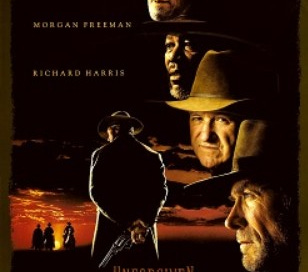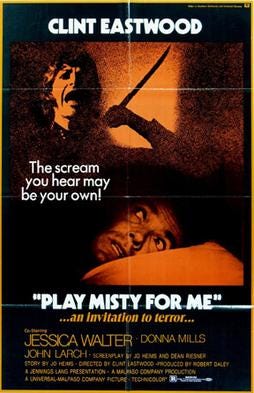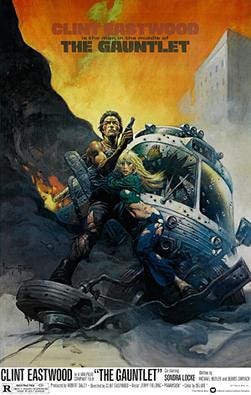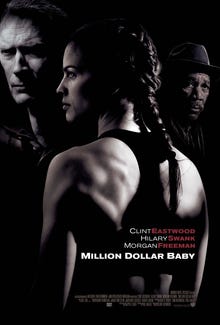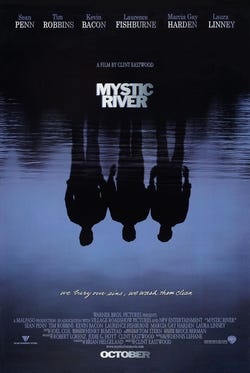Let’s look at neo-noir again, but instead of five unrelated movies we’ll explore several films all from the same director. You may not like his squinty (green) eyes or the horse he rode in on, but it’s impossible to say you don’t like any of Clint Eastwood’s films. When you watch any of them, you’ll notice the dark stories, told using contrast lighting techniques and slanted (oblique) angles, and a brave approach to sex or violence. You’ll see characters stepping out of shadows, and you’ll want to root for the main character even though you know he’s doing wrong. Additional characteristics are the sound effects and the very polished sets, even in a drama set in the Dust Bowl.
In 1971, Eastwood gave us Play Misty for Me, about a woman who can’t bear to be rejected by the man she’s just had a fling with—yesteryear’s Fatal Attraction, I guess. Eastwood’s directorial debut carries his special touches: glorious attention to the music plus a puzzle to figure out involving a quote from Poe. He’s an unmarried disc jockey spinning cool jazz and long blues in the middle of the night, and he flirts with caller Evelyn whenever she requests her favorite song, Erroll Garner’s rendition of Misty. Soon, when she realizes she’s not a permanent fixture in his life, she goes berserk. Eastwood’s disc jockey Dave does have a sort-of steady girlfriend he is kinda cheating on, and eventually he has to tell her in order to protect her.
That film perfectly exemplified one of Eastwood’s two favorite themes, according to David Kehr’s Clint Eastwood: Out of the Shadows for PBS in 2000. Many of his films focus on either warm families and reunions, or they peer deeper into the shadows looking at reclusive loners.
1977’s The Gauntlet demonstrated the latter. Eastwood stars as Ben Shockley, a Phoenix cop who likes his nightcaps any time of day, and he hasn’t earned any favors lately down at the station. When he’s assigned to escort a witness from Las Vegas back to Phoenix, he’s surprised it’s a woman, played by Sondra Locke. She’s Gus Mally, or “Mally No-Show,” as she points out the bookies are calling her. They’re betting Mally will never make it back to Phoenix alive, and she believes his boss assigned him for the transport betting he would screw it up and they would both get killed by the bad guys. Shockley decides to prove them wrong and deliver her to the courthouse. Would you bet they walk off together?
Unforgiven came in 1992, a bleak western, complete with the contrasts between light and dark limning the monotone landscape. It’s among those films designated for preservation by the Library of Congress, although it’s a rough story about aging gunslinger Will, retired as a widowed farmer with several kids, but needing to go out on just one more job. He fetches his old pal Ned played by Morgan Freeman, and they hire up with a group of prostitutes who want to retaliate against the cowboys who maimed one of them. The local sheriff has done nothing other than slap their wrists. Will and Ned show up in town and find out what they’re up against. I don’t know if any scene in a movie ever affected me like Will finding Ned’s body. The excellent cast is rounded out by Richard Harris, Gene Hackman, and Frances Fisher. On Oscar night Eastwood, nominated for Best Director and Best Actor, took home the award for Best Picture; the film earned a total of nine nominations.
Million Dollar Baby tore at our hearts in 2004. It’s adapted from a book of short stories written by a former fight manager and cut-man named Jerry Boyd, using pseudonym F.X. Toole. In this movie, you can feel the essence of Eastwood’s noir-ness, because he gives us not one but two lone, lost characters: gym owner Frankie Dunn and would-be boxer Maggie Fitzgerald, nimbly played by Hillary Swank. She begs him to train her but he says no, until finally he relents. Each time she’s ready for a new level, he tries to hold her back, and somehow you sense the unease in his life is just as much premonition as recollection. All of this is witnessed (and narrated) by his old, long-time friend and employee Eddie, played by—again—Morgan Freeman. Ultimately, tragedy does strike, and the end plays out, witnessed by Eddie hiding in a dark corner and writing it down in a letter to Frankie’s estranged daughter. Baby won four of its seven Oscar nominations: for Best Picture, Best Director, plus Best Actress for Hillary Swank and Best Supporting Actor for Freeman.
Many of Eastwood’s films involve a pair of lost people—the DJ and the lonely lady in Misty; the cop and the witness in Gauntlet. There’s a trio of lost souls in Mystic River, a 2003 movie based on a book by the one-and-only Dennis Lehane. Mystic was Eastwood’s first film score credit. It’s the story of three young boys playing together, when one of them is snatched off the street for four days. Twenty-five years later, they’ve all grown up (Kevin Bacon, Tim Robbins, Sean Penn), but they’re not all friends. It’s unbearable when Penn’s character finds out his daughter’s been murdered. But it chills your spine when Robbins’ character has to stand and look down into the river at the end. No matter which of Eastwood’s movies you watch, you’ll find a different generation, a scary movie, or something fun, biographical, or historical—but they all have those common threads, Eastwood’s neo-noir preferences, weaving through them.
(Movie poster images are free or fair use on Wikipedia; The Misty poster art can or could be obtained from Universal Pictures. Gauntlet artwork by Frank Frazetta. Copyrights are believed to belong to the distributor of Million Dollar Baby and Mystic River, Warner Bros. Pictures, the publisher of the items promoted or the graphic artists.)
This article previously appeared in Braegen of ECOM, Karen Bujak, editor


